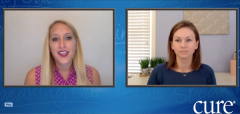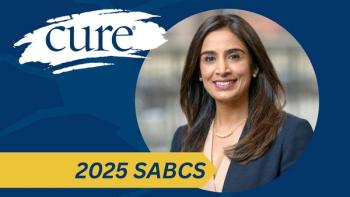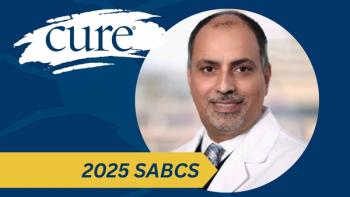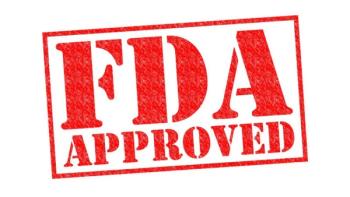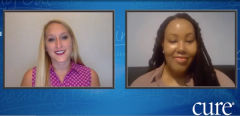
Talking with Your Family About Metastatic Breast Cancer

Kristie L. Kahl: What are some ways that a metastatic breast cancer diagnosis might affect the family dynamic, whether it be with your partner or your children or your family?
Kate Watson: I'm sure a metastatic diagnosis of any cancer type changes a lot of dynamics within the family. I mean, first, you're shocked that this is the diagnosis that you're facing. There's fear, there's anxiety. And you might be the patient that's going through all the physical changes and the treatment but that doesn't mean that it's not weighing heavily on your your family, your parents, your partner's your spouse, your kids. And so I really think from the get go, it's important to open In the lines of communication and make sure that everybody is on board with either knowing that they're going to be sharing how they're feeling openly and and letting the patient sort of drive, how the conversations are going to go. But the patients also have to be respectful that this has an impact on the whole family's life.
Kristie L. Kahl: If somebody does have young children, do you have any advice on how they can have these conversations with their kids or maybe not even have the conversations with their children about their diagnosis?
Kate Watson: Sure. When I was diagnosed, my daughters were two and four at the time. And so I really struggled with what's, what's the right way to tell them what's too much what's too little, because obviously, it's going to be a lifetime experience for them, but at the same time, they don't really know any different when they're that young. So my first piece of advice would be to wrap your head around. What you think your treatment plan is going to be before you even talk to your kids? Are you going to be on a type of drug where you're going to lose your hair? Are you going to have surgeries where you're going to have a long recovery period. And once you kind of know what it is that you need to explain to your kids, you can then break it down into what's age appropriate, because we don't want to scare them into thinking that Mom's going somewhere tomorrow. And this is imminent, but it is a lifelong disease. So my kids were involved. When I shaved my head, we had a hair shaving party to make it a little less scary. I didn't want to walk into the house one day, and all of a sudden be bald, and my two year old has no idea what's going on. But at the same time to breaking it down into what they needed to know. I also would say if you can have the same caregivers, if you're going to treatment, to kind of continue to make their routine as normal in a very abnormal situation
was helpful for us.
Kristie L. Kahl: Are there any resources that are available that you can recommend to kind of help children cope with their parents diagnosis?
Kate Watson: Absolutely, I would say have a conversation with your hospital systems oncology social worker, that was where I kind of first started to find out different programs that might be available for my kids. If as we're going through treatment, something arises, I was often in touch with them just kind of asking for their advice of how would you frame this conversation with a kid who's this age? It's also difficult in that when you're raising kids, you never know if the behavior that they're exhibiting is because mom has cancer or if it's just a normal kid thing. And so that's where I found difficulty in my head kind of going over, you know, is this cancer related and that social workers hospital system were really great at connecting me with local resources. That kind of helped me think about the way that I was going to talk through what was happening before I actually sat down and talk
Kristie L. Kahl: Do you have any advice that you could offer to other parents? Like I know sometimes we've heard some parents say, don't say the word sick. Is there anything like that that you can offer?
Kate Watson: Absolutely. They made it very clear not to say that Mom's going for medicine, because you don't want a kid to think that anytime they come down with an ear infection or cold and flu, and they just have to take over the counter stuff. But this is not the same as what mom is taking. And that cancer isn't contagious. And just like every person is different. Every cancer is different, too. So when you are out and about and you see somebody who looks sick, that cancer is different than mom or dad's cancer, and just to kind of keep them from fearing the absolute worst from the day you are diagnosed.
Kristie L. Kahl: Can you just talk about some of these, you know, emotions that people can feel and maybe how we can help negate these issues?
Kate Watson: Sure. So for me, when I was diagnosed, I was 35 years old. So I kind of fell in that range where I had my husband, that was having emotions. I had my parents who also are in relatively good health. And so everybody kind of goes like, why is this happening to her and I know that when you're in this younger diagnosed generation, sometimes parents feel guilt, that it's their child, but at the same time, I'm raising children. And then there's my husband too, who wants to swoop in and just try and fix it all. So we really had to sit down and have a an honest family discussion about how are we going to deal with this? What are we going to talk about in front of the kids, getting grandparents on board with what you've told your children so that they're not feeding them information that you don't feel comfortable with them? Sharing too, it's just kind of rallying your tribe and making sure that everybody's on the same page and that everybody feels comfortable sharing open and honestly what they're feeling based on your diagnosis.
Kristie L. Kahl: Definitely. And so, you know, obviously, being a mom can be a busy job in and of itself. But, you know, when you're faced with a metastatic breast cancer diagnosis, there's this issue of trying to have balance and you know, fitting treatments into your schedules. Do you have any advice for other mothers who are probably facing the same exact thing?
Kate Watson: Sure. And that was one of the hardest things is I was so used to saying yes to everything for my kids and being involved in all of their activities. And when I was going through my act of chemotherapy, you know, the traditional sense where I was feeling really gross and hair was falling out. It's a it's a mental struggle to know that you're going through this so that you can be here for your kids, but at the same time, you can't you feel like you can't go to the field trips or you can't chaperone this event or you can't shuttle them off to the all the different actions That you, you were pre cancer. And so I think to give yourself grace to know that this is a moment in time and to find your tribe, and figure out who else you can lean on. I know sometimes as moms, it's really hard to ask other people for help. But in this situation, people are often looking for ways to help you and so the clearer you can be and how they can help you with your parenting responsibilities, is so helpful. And it's also good for the kids to to know that they have a few people that can come in and help so that mom can feel a little bit better on the days when she's not feeling so great so that when she bounces back, she can't get right back into the thick of things. So So what would you say is your biggest piece of advice for a woman with metastatic breast cancer and trying to balance and cope with her family dynamic while also obviously dealing with her own disease? Yeah, I my biggest piece of advice would be Don't be afraid to ask for help. Whether that comes from your family, from your friends, from local support groups that you get involved with metavivor has wonderful peer to peer programs throughout most states in the country that you can connect with other women living with metastatic breast cancer. And that has been so helpful to me to connect with other moms who have this diagnosis and are also trying to figure out how to raise their kids as best they can in spite of it.

